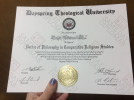Thunderforce90
Filing Flight Plan
- Joined
- Feb 13, 2024
- Messages
- 9
- Display Name
Display name:
Thunderforce90
So for some context, I’m a 20yo aspiring pilot who is not currently in college, and I was thinking about if this dream of mine is even gonna be possible anymore without a college degree. I work full time right now, and based on my current income I project to be able to pay for flight school completely in cash by the summer of 2026(assuming I’m working while doing my flight training), but I’m worried that it will all be in vain, and my window of opportunity to become a pilot without needing to get a degree will be closed, as the hiring market is starting to slow down for FO’s, and I’ve heard of speculation that airlines may reinstate the degree requirement within the next few years to weed out their high number of applicants. There’s no way I’m gonna be able to go to college AND flight school without taking on sizeable loans. Also yes I know there are other avenues to go down other than airline, but ideally that would be my end goal, as I’ve heard other alternative pathways like cargo or corporate are hard to get into without either getting lucky or knowing a guy. So basically the TLDR is, will a degree ever become necessary again to get to the airlines, and if so, are there any ways to get in without a degree should that time come, or are there any good alternatives to the airlines?



